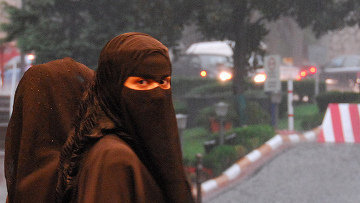PARIS, July 1 (RAPSI) – The European Court of Human Rights ruled on Tuesday that the French law banning full-face veils in public was legitimate, AFP reports on Tuesday.
A French national aged 24 and identified as S.A.S., who is a practicing Muslim, complained to the court that she was no longer allowed to wear the burqa (a full-body covering including a mesh over the face) and the niqab (a full-face veil leaving an opening only for the eyes) in public following the entry of the law into force in 2011. She complained that the ban led to discrimination on grounds of sex, religion and ethnic origin, to the detriment of women who, like herself, wore the full-face veil.
The court said in its ruling that respect for the conditions of “living together” was a legitimate aim for the measure at issue and that the ban imposed by the French law did not breach the European Convention on Human Rights.
The law banning full-face veils, including the Iranian hijab, Arab niqab and Afghan and Pakistani burqa, in public spaces was approved in France in 2010 and entered into force in April 2011 under former President Nicolas Sarkozy. It has been fully backed by the current Socialist government.
The fine for violating the veil law is EUR 150. The public spaces include streets, parks, beaches, shops, restaurants, theaters, terminals, administrative and educational institutions, hospitals, museums, libraries, gyms and public transportation.
At the same time, Muslim women can wear a burqa, niqab or hijab at home, in hotel rooms, on the premises of closed associations and at enterprises, as well as in the houses of prayer or near them and during religious processions.
The law bans the wearing of face-covering headgear, including masks, helmets, balaclava, niqabs and other veils covering the face in public places, except under specified circumstances. It applies to all citizens, including men and non-Muslims, who may not cover their face in public except where specifically provided by law (such as motor-bike riders and safety workers) and during established occasional events (such as some carnivals).



